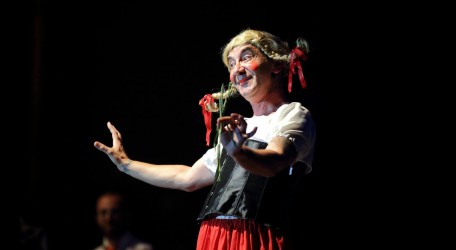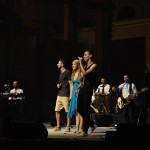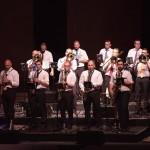
It’s a small world
Photo by Christine Joan Muscat Azzopardi
Kelma Kelma Nota Nota ended its series of summer shows this week with “Kieku d-dinja keen Maltija” (If the world were Maltese).
Ajma hej, I hear you saying (which roughly translates to “that’s all we need!”).
We know ourselves well enough to admit that being Maltese is a sometimes crazy mixture of a disproportionate dose of self-importance which is often counter-balanced by a nagging feeling of being not quite as “good enough” as everyone else.
All this and more was acknowledged and even celebrated by Michael Spagnol, Ray Calleja and the Big Band Brothers in their fusion of comedy, music, and literary wit.
The reason these shows have been such a success is because they have cleverly tapped into the Maltese psyche and personality, by gently showing us that we can poke fun at ourselves without going down the road of Malta-bashing, which (quite rightly) would put people’s back up. This particular show took up the theme of national pride, which has been very much in the news lately, especially as we continue to grapple with what it “means” to be Maltese as our cultural fabric learns to absorb an ethnic mix of peoples from all over the world.
I left the show mulling over all the paradoxes of our country which were so accurately highlighted: for such a tiny place we have a love of excess; whether it is in the amount of food we consume, the sheer volume of noise we manage to create and even our typically corpulent bodies. God forbid we had to take over the world, the show’s producers told us, because we would manage to make everyone like us. But this teasing criticism (which we all agreed to, as we laughed with recognition) was also balanced by our endearing qualities which somehow still manage to shine through. It’s like when you point out your partner’s exasperating flaws which drive you round the bend, but which make you love them nonetheless.
The fierce pride we feel because we are from such a small country cannot really be understood, I think, unless someone has lived here for a while. It is this which makes us so territorial and protective, anxious not to be swallowed up by “the other”, “the foreigner”. It is not really a misplaced fear considering we have been there, done that, with such a long history of being colonized and ruled over.
What was spine-tingling with this last show was the way Ray Calleja & co. managed to unite the large audience in the type of emotional patriotism I have rarely seen in this country. There is so much that stupidly divides us, that it was wonderful to see all the barriers of division fall magically away. Being part of such a large crowd, singing along with those old favourites Viva Malta and Xemx with Daniel Cauchi and his band, was one of the most moving things I have ever seen. It is the kind of love of one’s pop cultural heritage which we often see on Italian TV, as the Italian audience embraces the nostalgia of its “golden oldies”. To some it might have been corny, but sometimes, corny is nice.
The moments which made us stop and think were there as well: such as when the members of the band thumped on their chests and clapped their hands to provide the rhythm to the a cappella rendition of Lil Malta by Walter Micallef. Malta has been ruined by contractors, Daniel Cauchi sang, who have become rich building a concrete jungle, while leaving children no where to play. Hearing this song for the first time, I wondered why no environmental group has ever taken it up as its anthem. You could hear a pin drop in the silent audience as it listened attentively to the lyrics.
There was pathos as well, as Ray Calleja came out skipping, dressed as a little freckled face girl with pigtails, reciting Imanuel Mifsud’s haunting poem, Aqta’ fujra u ibni kamra. We laughed at his absurd get-up but then the words began to be absorbed, and the sardonic message came through. There was nothing more chillingly eloquent than when he abruptly pulled off his wig, with the final damning words, “hu nifs qawwi u mur indifen” (take a deep breath and bury yourself underground).
- The duo Marmalja with Brooke Borg
- The Big Band Brothers
- Daniel Cauchi
- Ray Calljea
Musical and comic entertainment used as social commentary are powerful tools, and were certainly used to excellent effect in this show. This time, I think the producers got that delicate mix of comedy and drama just right. In fact, there were moments when the audience reaction was just as telling as the messages on stage. For example, the silence which met Ray Calleja telling us that Malta has become a cosmopolitan island and that those who have come to live here either by choice or because they are refugees are also “Maltese”, was not an appreciative silence. It was more the stony silence of a country which is still not quite ready to accept all this influx of people making Malta their home.
After listening, and speaking to many people across the whole social spectrum, I have come to believe that you cannot force integration down people’s throats, because it just makes them resentful and rebellious. Perhaps it is time to thread more carefully, and (while obviously not encouraging xenophobia or racism) we need to acknowledge the sentiments of a nation in a state of flux which is bewildered, confused and sometimes downright angry at the fast-paced changes.
I must mention the young hip hop duo Marmalja. These two talented young guys confidently took to the stage, and made even the older members of the audience enjoy their rapping and especially their beat boxing. And then, of course, there was the husky-voiced Brooke Borg, with excellent performances throughout. It was, however, her interpretation of a slowed-down version of Viva Malta (accompanied by Daniel and Ray) which really showed her talent.
Ormai, as the Italians say, the gifts of the multi-talented Ray Calleja, Daniel Cauchi, the Big Band Brothers and the wordsmith Michael Spagnol, who has made us love our mother tongue again, are a given.
Together they have shown us that we are capable of putting up original shows which (to employ an often-used expression) “qishom ta’ barra” (are just as good as foreign ones). That is the kind of backhanded compliment about ourselves which we Maltese are so good at. It also encapsulates our hot/cold relationship with the rest of the world, as we learn to accept that our idiosyncrasies, our foibles and our maddening characteristics are what make us who we are, and to finally come to terms with being OK with all of them.
- August 30, 2015 No comments Posted in: Sunday Opinion Tags: Big Band Brothers, Daniel Cauchi, Kelma Kelma Nota Nota, Ray Calleja








